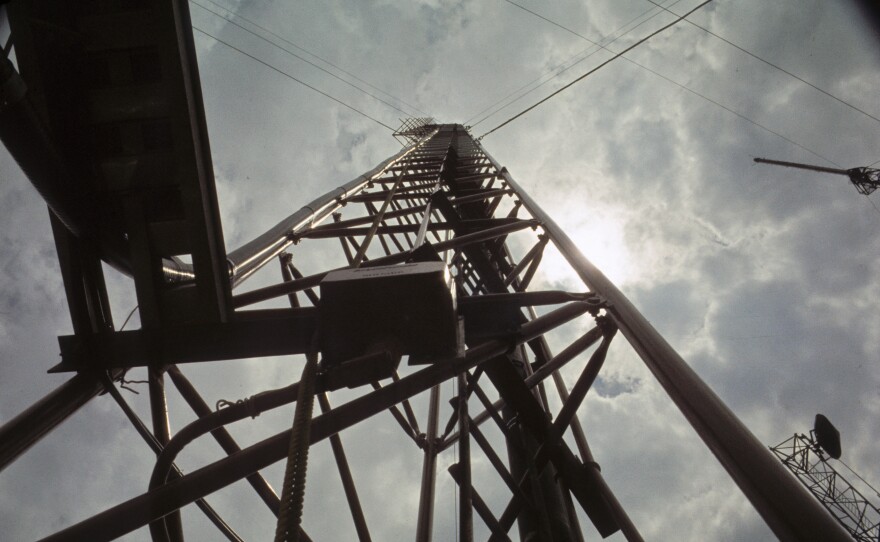- 1973
Aug. 23 - WVWR, the predecessor of WVTF, signs on. The station is
professionally operated by Virginia Western Community College and broadcast at 90.1 from a low power transmitter on the campus (the roof of Fishburn Hall). The reception area is limited to the Roanoke Valley. Chris Ryg is the station manager. It broadcasts a mix of local and NPR cultural, music and news programs. (Source: VWCC archive & newspaper) - 1974
May 1 - WVWR becomes an AP subscriber (Source: VWCC newspaper) - 1975
Sept. 2 - WVWR increases power to 100kw on 89.1 with a transmitter co-located on WBRA Public Television’s tower on Poor Mountain. This expands reception to a much larger portion of southwest Virginia. (Sources: FCC, VWCC archive & newspaper) - 1979
July 27 - Virginia Western Community College President Harold Hopper begins WVWR’s radio reading service for the visually impaired. The volunteer-run service still operates today through WVTF. (Source: VWCC archive, Roanoke Times) Image courtesy Virginia Western Community College
Image courtesy Virginia Western Community CollegeVirginia Western Community College President Harold Hopper begins the first radio reading service broadcast on July 27, 1979. - 1982
Facing a loss of funding from Virginia Western, the Virginia Tech Foundation purchases the station. The call letters are changed to WVTF. The station continues to broadcast from the Virginia Western studio until new space is ready in the Grand Pavilion building on Electric Road in Roanoke County. (Sources: The Roanoker, FCC) - 1990
Nov. - WVTF begins broadcasting on a full power transmitter in the Charlottesville area. WVTU is the station’s second full-power transmitter. Programming had been available in a smaller portion of the Charlottesville area via a translator since 1984. A third transmitter, located at Marion in Southwest Virginia, is added in 1991. (Source: Paxton Durham) - 1998
WVTF begins a news content sharing partnership with other public radio stations in Virginia. In 2003, the partnership is formalized as Virginia Public Radio, a grant-funded content generation and sharing partnership. It is still active today. (Source: Rick Mattioni) - 2003
WVTF begins broadcasting from its newly constructed broadcast center on Kingsbury Lane. A grand opening is held Sept. 19th. (Source: WVTF archive) WVTF archive
WVTF archive(L to R) Virginia Tech Vice President Larry Hincker, Rep. Bob Goodlatte, Roanoke Mayor Ralph Smith, Virginia Tech President Charles Steger and WVTF General Manager Glenn Gleixner cut a ceremonial ribbon at the new broadcast facility on Sept. 19, 2003. - 2003
An all news and information stream, Radio IQ, is launched on some frequencies. The main programming stream remains a mix of music and news/information. (Source: WVTF archive) - 2009
Dec. - WVTF opens a satellite studio and newsroom on Water Street in downtown Charlottesville. Today it’s staffed by a reporter and a corporate support representative. (Source: Paxton Durham) - 2017
July - Program streams and frequencies are switched so that the Radio IQ news and information stream is available on the most powerful frequencies. WVTF Music programming moves to the other frequencies. (Source: WVTF archive) - 2022
WVTF/Radio IQ wins the national Edward R. Murrow Award for Overall Excellence in the small market radio category. The award from the Radio Television Digital News Association (RTDNA) is among the most prestigious in broadcast news. (Source: WVTF archive, RTDNA) - Today
WVTF Music and Radio IQ broadcasts across nearly two-thirds of Virginia on more than 20 transmitters and translators. It’s also available around the world through its website and apps.
























